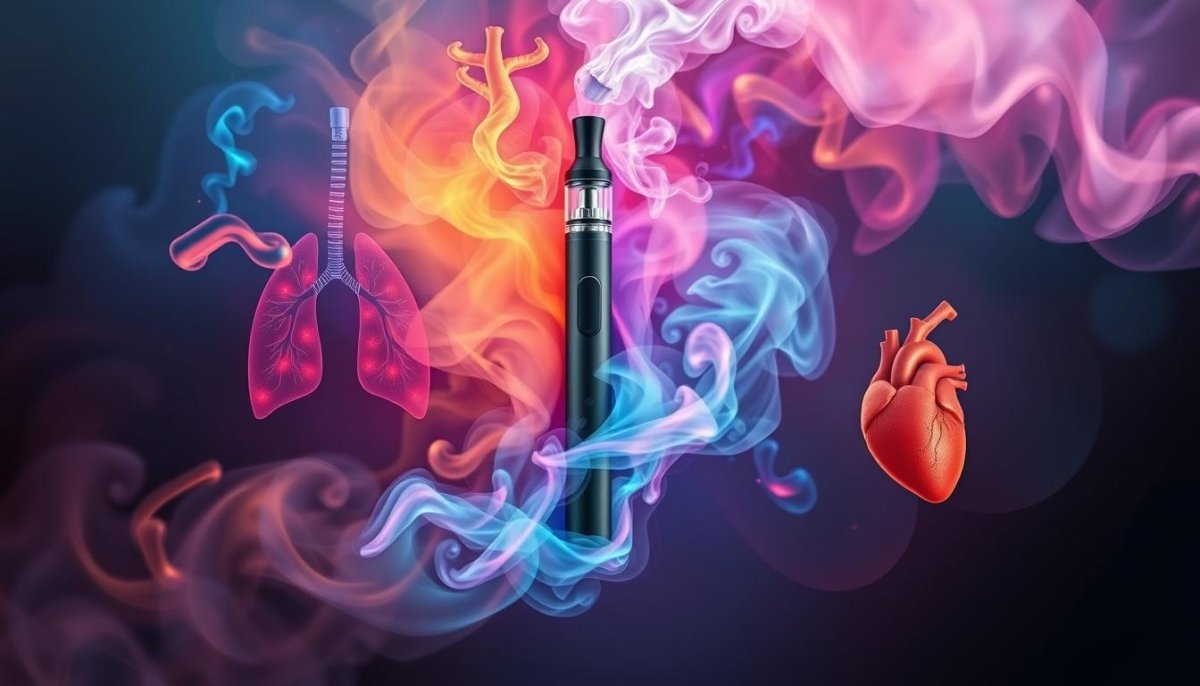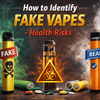E-Cigarettes: Key Health Effects You Need to Know

E-Cigarettes: Key Health Effects You Need to Know
E-cigarettes are getting more popular, and many people wonder about their health effects. In London, Sarah, a young professional, was curious. She saw her colleagues switch to vaping and wanted to know more.
Sarah looked into the latest research on e-cigarettes. She found a complex topic, where benefits and risks are debated. This article aims to explain the health effects of e-cigarettes. It's to help people like Sarah make informed choices about their health.
Key Takeaways
- E-cigarettes are seen as safer than traditional cigarettes, but their long-term effects are still being studied.
- Vaping can cause short-term issues like a faster heart rate and blood pressure. It may also affect breathing.
- Long-term vaping risks include lung damage, heart problems, and nicotine addiction.
- E-cigarette users might be exposed to harmful chemicals and additives.
- In the UK, there are rules to address health concerns about e-cigarettes.
Understanding Vaping: What Is It?
Vaping has grown in popularity, with many looking for a cigarette alternative. But what is vaping, and how does it differ from smoking? Let's look at the basics of e-cigarettes and the main differences between vaping and smoking.
The Basics of E-Cigarettes
E-cigarettes, or electronic nicotine delivery systems (ENDS), mimic smoking. They have a mouthpiece, battery, heating element, and a cartridge with liquid. This liquid, known as e-liquid or vape juice, turns into vapour when heated.
The e-liquid mix includes propylene glycol, vegetable glycerin, nicotine, and flavourings. When you inhale, the battery heats the liquid, creating vapour. This vapour is then inhaled and exhaled.
How Vaping Differs from Smoking
- Combustion: Traditional cigarettes burn tobacco, releasing harmful chemicals. E-cigarettes vaporise liquid without combustion.
- Nicotine Delivery: E-cigarettes offer controlled nicotine levels, unlike traditional cigarettes.
- Secondhand Exposure: E-cigarette vapour is seen as less harmful than cigarette smoke.
- Flavour Variety: E-cigarettes come in many flavours, appealing to some users.
It's important to understand vaping and smoking differences. This helps us assess their health impacts and safety.
Health Risks of Vaping
Vaping is becoming more popular, but it's important to know the health risks. E-cigarettes are seen as safer than regular smoking. But, new evidence shows they might not be as safe as thought.
Short-Term Effects on the Body
Vaping can cause immediate problems. People might cough, wheeze, or feel chest pain. It can also raise heart rate and blood pressure. Some users get nausea, headaches, or feel dizzy.
Long-Term Health Concerns
The long-term effects of vaping are still being studied. But, early findings suggest serious risks. Vaping might lead to heart diseases, lung damage, and even cancer. The long-term effects of inhaling vape chemicals are still unknown.
| Potential Short-Term Vaping Dangers | Potential Long-Term Vaping Health Risks |
|---|---|
|
|
The vaping dangers and vaping health risks are serious. As research finds more about vaping's harms, it's key to know the risks. This helps people make smart choices about their health.
"The long-term effects of vaping on health are still not fully understood, but the available evidence suggests that it may pose significant risks to users."
Chemicals Found in Vape Products
E-cigarettes are getting more popular, and it's important to know what's in the vape liquids. These liquids, or e-liquids, can affect e-cigarette safety and vaping health risks.
Common Ingredients in E-Liquids
Most e-liquids have propylene glycol and vegetable glycerin. These liquids are colourless and odourless. They help create the vapour you see when you vape. Other things like flavourings, nicotine, and additives are also common.
- Propylene glycol: A synthetic liquid that gives you the 'throat hit' and makes vapour.
- Vegetable glycerin: A thick, sweet liquid that makes big, visible vapour clouds.
- Flavourings: There are hundreds of flavours to mimic different tastes.
- Nicotine: Many e-liquids have nicotine, the addictive chemical in tobacco.
Harmful Additives to Watch Out For
Some ingredients in e-liquids seem harmless, but others are worrying. Certain additives in vape products can harm your health.
- Diacetyl: This flavouring was once used for a buttery taste but is linked to 'popcorn lung'.
- Vitamin E acetate: This oily additive is connected to EVALI, a lung injury from vaping.
- Formaldehyde: When e-liquids get too hot, this chemical forms. It's linked to cancer risk.
Knowing about these harmful additives is key for anyone thinking about using e-cigarettes or vaping products.
Vaping and Respiratory Health
The rise in electronic cigarettes, or vaping, has sparked worries about its impact on breathing. It's important to look into how vaping affects lung function and its link to breathing diseases. This helps us understand the dangers of vaping health risks.
Effects on Lung Function
Many studies show vaping harms lung function. The chemicals inhaled can irritate the lungs, causing coughing, wheezing, and breathing difficulties. These issues can last a long time, affecting how well the lungs breathe.
Connection to Respiratory Diseases
Vaping is linked to breathing diseases, including EVALI (e-cigarette or vaping product use-associated lung injury). This condition can cause serious lung damage, leading to hospital stays and, sadly, death.
Research also points to vaping increasing asthma and COPD risks. The long-term effects of vaping's chemicals are still being studied. But, the harm to breathing systems is a big worry.
| Respiratory Health Impact | Short-Term Effects | Long-Term Effects |
|---|---|---|
| Lung Function | Coughing, wheezing, shortness of breath | Impaired oxygen and carbon dioxide exchange |
| Respiratory Diseases | EVALI (e-cigarette or vaping product use-associated lung injury) | Increased risk of asthma, COPD, and other respiratory illnesses |
Vaping is a big risk to breathing health, both now and in the future. It's key for those vaping, health experts, and lawmakers to know these dangers. This knowledge helps tackle this growing health issue.
"Vaping-related lung injuries have become a serious public health issue, and the long-term effects of inhaling the chemicals in vaping products are still largely unknown."
Vaping and Mental Health
Vaping's effects on mental health are not as well-known as its physical risks. Yet, it poses a significant concern. Nicotine addiction from vaping can lead to various psychological issues that need attention.
Impact on Stress and Anxiety
Research shows vaping can increase stress and anxiety. E-cigarettes can release hormones like cortisol, causing tension and unease. This is a big problem for those with mental health issues, as vaping can make things worse.
Nicotine Addiction and Mental Clarity
Nicotine in e-cigarettes is highly addictive. Users can become dependent, leading to withdrawal symptoms. These symptoms can affect thinking and emotions, making everyday life harder.
| Vaping Effect | Impact on Mental Health |
|---|---|
| Nicotine Addiction | Withdrawal symptoms, impaired cognitive function |
| Stress and Anxiety | Heightened feelings of tension and unease |
| Disrupted Sleep | Fatigue, mood swings, and decreased concentration |
As research continues, it's important for users to know the risks. If vaping affects your mental health, seek help.
"The mental health consequences of vaping are often overlooked, but they can be just as detrimental as the physical side effects. Addressing this aspect of e-cigarette use is crucial for a comprehensive understanding of the overall impact on individuals and public health."
Demographics of Vaping Users
The rise in teen vaping is a big worry in the UK. E-cigarettes are getting more popular, and it's important to know who's using them. Let's look at who's vaping and the worrying trends among young people.
Who Is Vaping?
Studies show vaping isn't just for one age group. But, younger people are more likely to try it. In the UK, many vapers are between 18 and 24. Also, more and more teens are trying e-cigarettes.
- A survey by the Office for National Statistics found 18.7% of 18 to 24-year-olds in the UK vape. This is the highest rate among all ages.
- The same study showed 4.5% of 11 to 15-year-olds in the UK vape. This is a worrying trend.
Trends Among Young Adults and Teens
The teen vaping epidemic is a big worry. We don't fully know how vaping affects young, growing bodies. Appealing flavours, thinking vaping is safer, and social media and peer pressure all play a part.
"Vaping has become a social norm among young people, with many view it as a harmless hobby. However, the is vaping bad for you question remains unanswered, and the potential risks to their health cannot be ignored."
As we talk more about the teen vaping epidemic, it's key for everyone to work together. Policymakers, healthcare workers, and teachers need to join forces. They must educate and support the younger generation to keep them safe.
Regulatory Measures on Vaping
E-cigarettes have become more popular, leading governments to act. In the UK, laws and restrictions are in place. They aim to keep users safe and stop young people from vaping.
Current Laws and Restrictions
The UK's rules for e-cigarettes come from the Tobacco and Related Products Regulations 2016. These rules cover many areas, including:
- Restrictions on the sale of e-cigarettes and e-liquids to those under the age of 18
- Requirements for e-cigarette devices and e-liquids to meet certain safety and quality standards
- Limits on the size of e-liquid containers and nicotine strength
- Restrictions on the advertising and promotion of e-cigarette products
The Role of FDA in E-Cigarette Regulation
In the UK, rules are made at home. But, the US Food and Drug Administration (FDA) also plays a big part. They have strict rules for e-cigarette products in the US. These rules aim to stop young people from vaping and address e-cigarette safety and vaping health risks.
Both the UK and the FDA aim to balance safety with giving adult smokers a less harmful option. This is compared to traditional cigarettes.
"Effective regulation is crucial to addressing the potential health risks of vaping and protecting vulnerable populations, while also recognising the potential for e-cigarettes to support smoking cessation."
Vaping vs. Smoking: A Comparison
The debate on vaping and its health effects is ongoing. It's important to know the risks of vaping compared to smoking. Both involve inhaling substances, but their differences can affect health greatly.
Relative Risks of Both Practices
Studies show vaping is less harmful than smoking. E-cigarettes have fewer harmful chemicals than tobacco smoke. Yet, vaping's long-term effects are still being studied, raising concerns about e-liquid ingredients.
Smoking, however, is known to cause many health problems. It leads to lung cancer, heart disease, and stroke. The smoke from tobacco contains many harmful substances.
Harm Reduction Perspectives
Many see vaping as a way to reduce harm for smokers. Switching to e-cigarettes might lower exposure to harmful tobacco smoke. This could lead to better health. But, critics say vaping might keep nicotine addiction alive.
| Vaping | Smoking |
|---|---|
| Generally less harmful than smoking | Leading cause of numerous health issues |
| Fewer harmful chemicals and toxins | Exposure to thousands of chemicals in tobacco smoke |
| Potential harm reduction strategy for smokers | No safe level of exposure to tobacco smoke |
The debate on vaping vs. smoking continues. Both sides have different views. As research and rules change, people must think about the risks and benefits for their health.
Benefits of Quitting Vaping
Stopping vaping can greatly improve your health and wellbeing. Whether you've vaped for years or just want to stop, knowing the benefits can help you start.
Positive Changes After Cessation
When you quit vaping, your body starts to heal. You'll notice many good changes, such as:
- Improved lung function and better breathing
- Less risk of heart problems
- Less anxiety and stress
- Clearer mind and better focus
- Less risk of vaping side effects and nicotine addiction from vaping
You might also find your taste and smell improve. Plus, you'll have more energy.
Resources for Those Looking to Quit
Quitting vaping can be tough, but you're not alone. The UK offers many resources to help you stop vaping:
- NHS Smokefree: They provide free help, including a helpline, app, and local groups.
- Local Vape Shops: Many offer programmes and advice to help you quit.
- Online Support Communities: Join forums and groups to connect with others who've quit.
- Counselling and Therapy: Talk to a healthcare professional for help with quitting's mental side.
Quitting vaping is a journey. Be patient and kind to yourself. With the right support, you can beat vaping side effects and nicotine addiction from vaping and get your health back.
Future of Vaping: Trends and Research
The vaping world is changing fast, with new tech and research leading the way. Companies are working hard to make vaping better, from new mod kits to safer e-cigarettes. They're trying to fix the big worries about vaping health risks and e-cigarette safety.
Innovations in Vaping Technology
Temperature-controlled mods and sub-ohm tanks are big in vaping now. They let users control power and temperature, improving flavour and vapour. This could also lower the risk of e-liquid damage.
Also, new nicotine systems like nicotine salts are being looked at. They might give users a better experience, especially for those quitting smoking.
Ongoing Studies on Health Effects
Even with new vaping tech, health studies are still key. Researchers in the UK and worldwide are studying vaping's long-term effects. They want to know the risks and benefits to help shape the vaping future.
FAQ
What are the health risks associated with vaping?
Vaping can harm your health in the short and long term. It can cause heart and lung problems right away. Over time, it might lead to chronic lung diseases and nicotine addiction.
What chemicals are found in vape products?
E-liquids often have propylene glycol, vegetable glycerin, and flavourings. But, some may also have harmful additives like diacetyl. This chemical is linked to a serious lung condition.
How does vaping affect lung function and respiratory health?
Vaping can harm your lungs, causing "popcorn lung" and EVALI. It can also lead to other respiratory diseases.
Can vaping impact mental health and cause nicotine addiction?
Yes, vaping can increase stress and anxiety. The nicotine in e-cigarettes can also lead to addiction. This can affect your mental clarity and cognitive function.
Who is vaping, and what are the trends among young adults and teens?
Young adults and teens are increasingly vaping. This is called a "vaping epidemic." It's worrying because young people are more likely to become addicted to nicotine.
How do the health risks of vaping compare to traditional smoking?
Vaping is not as safe as thought. It still poses significant health risks. The long-term effects of vaping are not fully understood, and its risks compared to smoking are debated.
What are the benefits of quitting vaping?
Quitting vaping can improve your lung function and reduce heart risks. It can also help you overcome nicotine addiction. There are many resources and support services in the UK to help you quit vaping.






